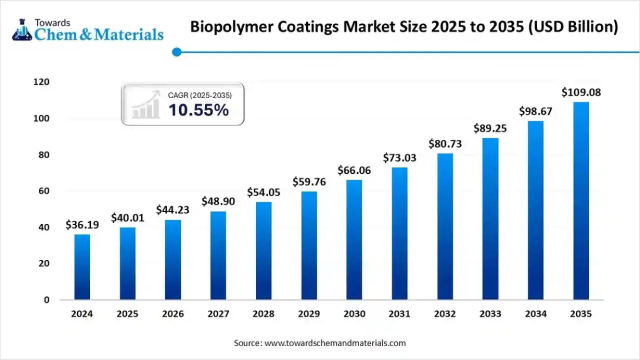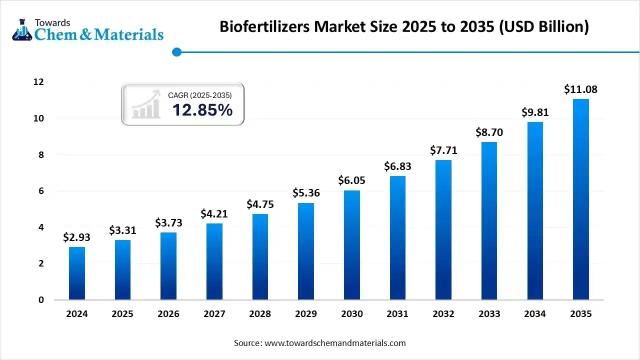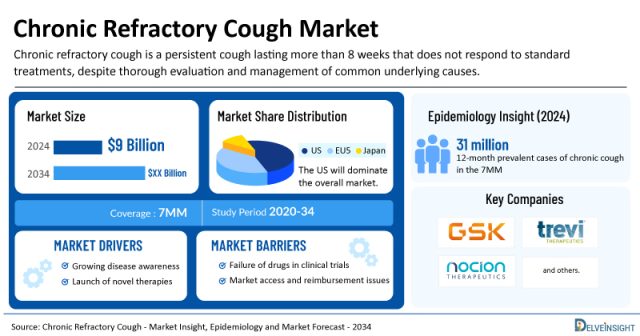The market is currently redefining itself through a massive pivot from legacy injectables to precision oral therapies and cost-efficient biosimilars. Major players execute high-value acquisitions to secure next-generation pipelines while managing the inevitable decline of older blockbuster assets.
Chicago, Nov. 24, 2025 (GLOBE NEWSWIRE) — The global rheumatology therapeutics market was valued at US$ 28.75 billion in 2024 and is expected to reach US$ 38.34 billion by 2033, witnessing a CAGR of 3.4% during the forecast period 2025-2033.
A dramatic expansion in patient volume is currently reshaping the rheumatology therapeutics market landscape. Recent epidemiological data from 2024 confirms that 18 million new cases of rheumatoid arthritis were identified globally. Within the United States, Medicare claims analysis highlights that 1.3 million beneficiaries aged over 65 are actively receiving treatment. Looking ahead, the trajectory appears even steeper, as projections indicate 78 million Americans will carry an arthritis diagnosis by 2040. Clinical research recruitment mirrors this urgency, with 523 participants enrolling in the Phase III NAV3-33 trial to validate early diagnostic imaging. Furthermore, 242 patients joined vagus nerve stimulation trials, highlighting the growing population of refractory cases needing novel interventions.
Request Sample Pages: https://www.astuteanalytica.com/request-sample/rheumatology-therapeutics-market
Regional burdens are equally significant, adding momentum to the Rheumatology therapeutics market. Updates on disease burden from East and South Asia reported a staggering 4.8 million diagnosed cases in 2024. Meanwhile, clinical precision is improving, evidenced by the recruitment of 338 patients with early, dual seropositive rheumatoid arthritis for the AMPLIFIED Phase 3 trial. These rising numbers create a pressing need for scalable solutions. Consequently, the sheer volume of patients requiring long-term care has physically expanded, forcing stakeholders to rethink supply chains and delivery models to accommodate millions of new entrants seeking relief.
Key Findings in Rheumatology Therapeutics Market
| Market Forecast (2033) | US$ 38.84 billion |
| CAGR | 3.4% |
| Largest Region (2025) | North America (41.32%) |
| By Drug Type | DMRDs (55.45%) |
| By Disease Indication | Rheumatoid Arthritis (41.17%) |
| By Route Of Administration | Injectable/Infusion (55.0%) |
| Top Drivers |
|
| Top Trends |
|
| Top Challenges |
|
AbbVie Financial Benchmarks Confirm Massive Value in Immunology Sector
Financial performance among market leaders provides undeniable proof of the rheumatology therapeutics market’s vitality. For instance, AbbVie has officially confirmed guidance of USD 16.5 billion in global sales for Skyrizi alone in 2025. Additionally, revenue guidance for Rinvoq has been raised to USD 8.2 billion for the same fiscal period. Together, these two dominant assets are targeted to exceed USD 25 billion in sales, effectively surpassing the historical peak revenues of Humira. Quarterly results validate this aggressive outlook, as Skyrizi generated USD 4.7 billion in absolute revenue during Q3 2024, while Rinvoq contributed USD 2.2 billion.
Capital flows are following these revenue streams to secure future supply. To support this growth, AbbVie committed USD 10 billion in capital investment toward expanding US manufacturing capacity over the next decade. Management also raised the company’s total 2025 revenue floor by USD 400 million specifically due to immunology demand. Such financial commitments signal that the Rheumatology therapeutics market remains a high-growth priority for investors. The successful transition from legacy TNF inhibitors to next-generation targeted therapies proves that paying for innovation yields substantial returns.
Biosimilar Entrants Trigger Rapid Price Erosion and Volume Shifts
Competition has fundamentally altered the commercial landscape of the global rheumatology therapeutics market. As of late 2024, 10 distinct Adalimumab biosimilars are commercially available to US patients. A major tipping point arrived in April 2024 when CVS Caremark removed the originator Humira from its formularies. Following this strategic pivot, biosimilar prescriptions surged to account for nearly 1 in 4 adalimumab scripts, totaling approximately 250,000. Prices reacted instantly, with the net price per prescription dropping to USD 2,837. Over a five-year span, the average sales price of rheumatology biosimilars has decreased by USD 2,200, stabilizing only recently.
Regulatory tailwinds are accelerating this disruption within the Rheumatology therapeutics market. The FDA approved 19 new biosimilars in 2024, including 6 specifically for ustekinumab. Among the competitors fighting for share, the Sandoz-produced adalimumab-adaz captured 55.5% of all biosimilar prescriptions. Such rapid erosion demonstrates that volume is shifting decisively toward cost-effective options. Payers and providers are clearly embracing these alternatives, creating a market environment where accessibility improves as exclusivity periods expire.
Innovation Pipeline Pivots Toward Novel Oral Small Molecule Therapies
Research and development efforts are reaching unprecedented levels of activity. Currently, there are over 80 distinct therapies for rheumatoid arthritis in active development pipelines. More than 75 key pharmaceutical companies have registered active clinical programs in 2024 alone. Looking at the broader trend, 1,100 clinical trials have been initiated globally over the last six-year window. Geography plays a crucial role here, as Mainland China accounted for 58 of every 100 new trials initiated in 2024. Specific trials like Phase 3 SHR0302 are pushing boundaries, having randomized 566 patients to test highly selective inhibitors.
Mechanism-specific studies are yielding promising data for the Rheumatology therapeutics market. In a major 2024 study, 189 patients received a 4mg dose of ivarmacitinib, showing significant engagement. Early-stage innovation is also vibrant, with 9 patients dosed in a repeat-dose Phase I trial for CIT-013 mid-year. These efforts reflect a strategic move away from broad immunosuppression toward precise pathway modulation. The intense density of these clinical programs suggests that future standard-of-care treatments will offer higher specificity and better patient convenience.
Severe Workforce Shortages Create Bottlenecks in Care Delivery Across the Rheumatology Therapeutics Market
Despite therapeutic advances, a crisis in human capital threatens patient access. The US currently relies on just 5,667 clinically active rheumatologists. This limited workforce struggles under a heavy burden, with data showing 3,758 patient visits required per male rheumatologist annually. Projections for 2025 warn of a deficit of 2,576 adult rheumatologists needed to match patient volume. Geographic disparities are stark, as 72 out of every 100 US counties have zero clinically active rheumatologists. Rural areas fare even worse, with 93 out of 100 jurisdictions lacking a single provider.
Demographic realities among doctors exacerbate the issue. Statistics show that 50% of the current rheumatology workforce is aged over 55, signaling an impending retirement cliff. Although the number of Advanced Practice Providers in the field reached 379, this doubling is insufficient to fill the void. Consequently, the Rheumatology therapeutics market faces a significant delivery hurdle. Without a surge in new specialists, the infrastructure simply cannot support the growing number of patients requiring complex biologic management.
Regulatory Approvals Accelerate for Biosimilars and New Indications
Agencies are moving quickly to approve expanded treatment options. In 2024, the FDA approved 1 new interchangeable high-concentration biosimilar, adalimumab-ryvk. Two new tocilizumab biosimilars also entered the US market in the second quarter. Beyond copies, innovation continues with approvals for 3 new indications for Bimzelx, covering conditions like PsA and AS. Recognizing urgent unmet needs, regulators granted 1 Breakthrough Therapy Designation to nipocalimab for Sjögren’s disease.
Throughput at the FDA remains high in the rheumatology therapeutics market. The CDER approved 50 total new drugs in 2024, with a strong focus on immunology. Speed is a defining feature, evidenced by 4 distinct biosimilars receiving approval in a single quarter. Furthermore, 6 distinct biosimilars for Ustekinumab were approved, setting the stage for intense competition ahead of the 2025 patent cliff. These regulatory milestones ensure the market remains dynamic and competitive. Manufacturers can now rely on a predictable pathway for both novel assets and essential generic alternatives.
High Treatment Costs Shift Financial Burden to Patients
Economic pressures are reshaping how patients access care. Starting in 2025, Medicare Part D beneficiaries will see an out-of-pocket cap of USD 2,000. Despite this safety net, the average annual cost for Medicare patients on biologics stood at USD 36,053 in 2024. Those who are uninsured or unresponsive to initial therapies face even steeper challenges, paying up to USD 30,000 annually in out-of-pocket costs. However, competition is helping; the list price for newly launched tocilizumab biosimilars is USD 1,960 per vial.
A clear price divergence is emerging in the Rheumatology therapeutics market. The median annual cost for biologics facing biosimilar competition has dropped to USD 23,700. In contrast, biologics without such competition maintain a median cost of USD 42,527. These costs are often weighed against expensive surgical outcomes, as inpatient knee replacement surgery averaged USD 30,249 in 2024. Payers are increasingly using these cost differences to steer utilization, favoring more affordable biosimilars while reserving premium agents for the most difficult cases.
Clinical Trials Confirm Superior Efficacy and Safety Profiles in the Rheumatology Therapeutics Market
New data establishes higher standards for patient outcomes. In the pivotal IVARMACITINIB trial, 133 out of 189 patients successfully achieved an ACR20 response. Even more telling, 87 patients achieved substantial ACR50 improvement compared to just 29 in the placebo group. Head-to-head comparisons in the AMPLIFIED trial revealed that 59 out of 100 patients on Abatacept achieved ACR50, demonstrating efficacy on par with Adalimumab. Innovative approaches also scored wins, with the Vagus Nerve Stimulation trial reporting 35 out of 100 patients achieving statistically significant responses.
Safety data is proving equally robust for the Rheumatology therapeutics market. High-dose arms of major 2024 JAK-1 inhibitor trials reported 0 systemic opportunistic infections. Preventive strategies also showed immense potential; while 29 out of 100 high-risk placebo patients developed RA, only 9 out of 100 in the methotrexate treatment arm progressed to the disease. These findings empower clinicians to intervene earlier and more aggressively. The ability to induce remission safely is now a reality, driving demand for these advanced therapeutic options.
Tailor This Report to Your Specific Business Needs: https://www.astuteanalytica.com/ask-for-customization/rheumatology-therapeutics-market
Pediatric Expansion and Manufacturing Growth Secure Future Access
The rheumatology therapeutics market is broadening its scope to include younger patients and better infrastructure. 2024 marked a milestone with the approval of Rinvoq LQ, 1 weight-based oral solution designed for children. Approvals now extend to patients aged 2 years and older for active Psoriatic Arthritis. Regulators utilized extrapolation to expedite access, approving 3 pediatric drugs based on 0 new trials. Yet, a workforce gap remains; a shortage of pediatric rheumatologists means a deficit of 33 providers by 2025. Calculations suggest the actual demand gap exceeds 100 providers.
Physical assets are expanding alongside these clinical wins. AbbVie invested USD 223 million into Singapore manufacturing facilities to secure future supply. Regionally, North America holds 41% of the global revenue share, while the Asia-Pacific region tracks 3.2 million RA cases. To improve diversity in data, 10 new clinical trial sites were activated in Central Latin America. Currently, 13 major global sites manufacture key biologics like Enbrel. Access remains a challenge with US wait times averaging 45 days, but 1100+ rheumatologists contributing to the RISE registry ensures the Rheumatology therapeutics market continues to evolve through data.
Rheumatology Therapeutics Market Major Players:
- AbbVie, Inc.
- Amgen, Inc.
- Boehringer Ingelheim International GmbH
- Novartis AG
- Regeneron Pharmaceuticals Inc.
- Pfizer, Inc.
- Eli Lilly and Company
- Bristol-Myers Squibb Company
- F. Hoffmann-La Roche Ltd.
- UCB S.A.
- Johnson & Johnson Services, Inc.
- Other Prominent Players
Key Market Segmentation:
By Disease Indication
- Rheumatoid Arthritis
- Osteoarthritis
- Gout
- Ankylosing Spondylitis
- Lupus
- Others
By Drug Type
- Non-Steroidal Anti-Inflammatory Drugs (NSAIDs)
- Corticosteroids
- Disease-Modifying Anti-Rheumatic Drugs (DMARDs)
- Conventional Synthetic DMARDs
- Biologic DMARDs
- Targeted Synthetic DMARDs/JAK Inhibitors
- Uric-Acid-Lowering Agents (for gout)
By Route of Administration
- Oral
- Injectable / Infusion
- Topical
By Region
- North America
- Europe
- Asia Pacific
- Middle East and Africa
- South America
Need a Detailed Walkthrough of the Report? Request a Live Session: https://www.astuteanalytica.com/report-walkthrough/rheumatology-therapeutics-market
About Astute Analytica
Astute Analytica is a global market research and advisory firm providing data-driven insights across industries such as technology, healthcare, chemicals, semiconductors, FMCG, and more. We publish multiple reports daily, equipping businesses with the intelligence they need to navigate market trends, emerging opportunities, competitive landscapes, and technological advancements.
With a team of experienced business analysts, economists, and industry experts, we deliver accurate, in-depth, and actionable research tailored to meet the strategic needs of our clients. At Astute Analytica, our clients come first, and we are committed to delivering cost-effective, high-value research solutions that drive success in an evolving marketplace.
Contact Us:
Astute Analytica
Phone: +1-888 429 6757 (US Toll Free); +91-0120- 4483891 (Rest of the World)
For Sales Enquiries: sales@astuteanalytica.com
Website: https://www.astuteanalytica.com/
Follow us on: LinkedIn | Twitter | YouTube
CONTACT: Contact Us: Astute Analytica Phone: +1-888 429 6757 (US Toll Free); +91-0120- 4483891 (Rest of the World) For Sales Enquiries: sales@astuteanalytica.com Website: https://www.astuteanalytica.com/

Disclaimer: The above press release comes to you under an arrangement with GlobeNewswire. IndiaShorts takes no editorial responsibility for the same.




